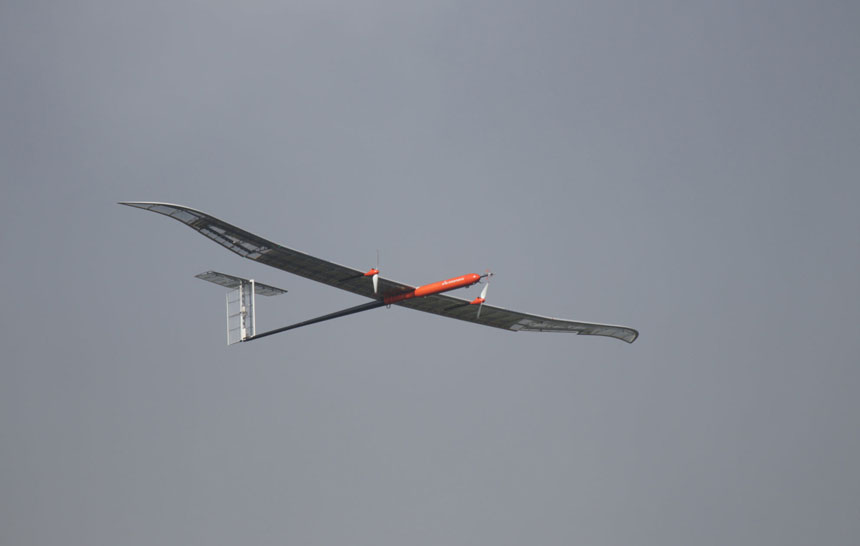Battery
LG Chem flew lithium-sulfur battery-loaded aircraft into the stratosphere.
By Sep 14, 2020 (Gmt+09:00)
1
Min read
Most Read
Samsung steps up AR race with advanced microdisplay for smart glasses


When in S. Korea, it’s a ritual: Foreigners make stops at CU, GS25, 7-Eleven


Maybe Happy Ending: A robot love story that rewrote Broadway playbook


NPS yet to schedule external manager selection; PE firms’ fundraising woes deepen


US auto parts tariffs take effect; Korea avoids heavy hit


LG Chem Ltd. has completed a test flight of an unmanned plane at the highest altitude using its lithium-sulfur battery for the first time in South Korea.
The battery maker said last week that a small aircraft, dubbed EAV-3, successfully underwent a flight testing of about 13 hours in the stratosphere using the next-generation battery in Goheung, South Korea.
LG Chem loaded a lithium-sulfur battery on the EAV-3 and conducted the test-flight from 08:36 am to 09:47 pm on Aug. 30.
EAV-3 is a high-altitude long-endurance solar-powered unmanned vehicle developed by Korea Aerospace Research Institute. It can fly in the stratospheric altitude of 12km or higher using solar energy and batteries. It charges energy using a solar cell placed on the top of the wing. It has 20m-long wings and a 9m-long body.

“It confirmed a stable charge and discharge function of a lithium-sulfur battery in the extreme environment of the stratosphere with a low temperature of 70 degrees below zero and atmospheric pressure of 1/25 of one at ground level, which is close to a vacuum state,” LG Chem said in a statement on Sept. 10.
A lithium-sulfur battery is one of the next-generation batteries which will replace a lithium-ion battery and considered as a key component of the future transportation such as electronic cars, long-endurance drones and personal aircraft.
The energy density of the lithium-sulfur battery is 1.5 times higher than the existing lithium-ion battery because it uses lightweight materials such as sulfur and carbon compounds for anode materials and lithium metal for cathode materials. It is also price competitive compared to the lithium-ion battery as it does not use rare metals, LG Chem added.
LG Chem plans to mass-produce a lithium-sulfur battery that has an energy density more than twice that of the current lithium-ion battery after 2025.
Write to Man-su Chose at bebop@hankyung.com
The battery maker said last week that a small aircraft, dubbed EAV-3, successfully underwent a flight testing of about 13 hours in the stratosphere using the next-generation battery in Goheung, South Korea.
LG Chem loaded a lithium-sulfur battery on the EAV-3 and conducted the test-flight from 08:36 am to 09:47 pm on Aug. 30.
EAV-3 is a high-altitude long-endurance solar-powered unmanned vehicle developed by Korea Aerospace Research Institute. It can fly in the stratospheric altitude of 12km or higher using solar energy and batteries. It charges energy using a solar cell placed on the top of the wing. It has 20m-long wings and a 9m-long body.

“It confirmed a stable charge and discharge function of a lithium-sulfur battery in the extreme environment of the stratosphere with a low temperature of 70 degrees below zero and atmospheric pressure of 1/25 of one at ground level, which is close to a vacuum state,” LG Chem said in a statement on Sept. 10.
A lithium-sulfur battery is one of the next-generation batteries which will replace a lithium-ion battery and considered as a key component of the future transportation such as electronic cars, long-endurance drones and personal aircraft.
The energy density of the lithium-sulfur battery is 1.5 times higher than the existing lithium-ion battery because it uses lightweight materials such as sulfur and carbon compounds for anode materials and lithium metal for cathode materials. It is also price competitive compared to the lithium-ion battery as it does not use rare metals, LG Chem added.
LG Chem plans to mass-produce a lithium-sulfur battery that has an energy density more than twice that of the current lithium-ion battery after 2025.
Write to Man-su Chose at bebop@hankyung.com
Yeonhee Kim edited this article
More to Read
-

-
 Electric vehiclesBYD’s Atto 3 overtakes Tesla’s Model Y as best-selling EV in South Korea
Electric vehiclesBYD’s Atto 3 overtakes Tesla’s Model Y as best-selling EV in South Korea5 HOURS AGO
-

-
 Corporate investmentLG Electronics breaks ground on $600 mn home appliance plant in India
Corporate investmentLG Electronics breaks ground on $600 mn home appliance plant in India22 HOURS AGO
-
 EarningsKakaoBank posts record Q1 profit, eyes Thai expansion after Indonesia
EarningsKakaoBank posts record Q1 profit, eyes Thai expansion after IndonesiaMay 08, 2025 (Gmt+09:00)
Comment 0
LOG IN


